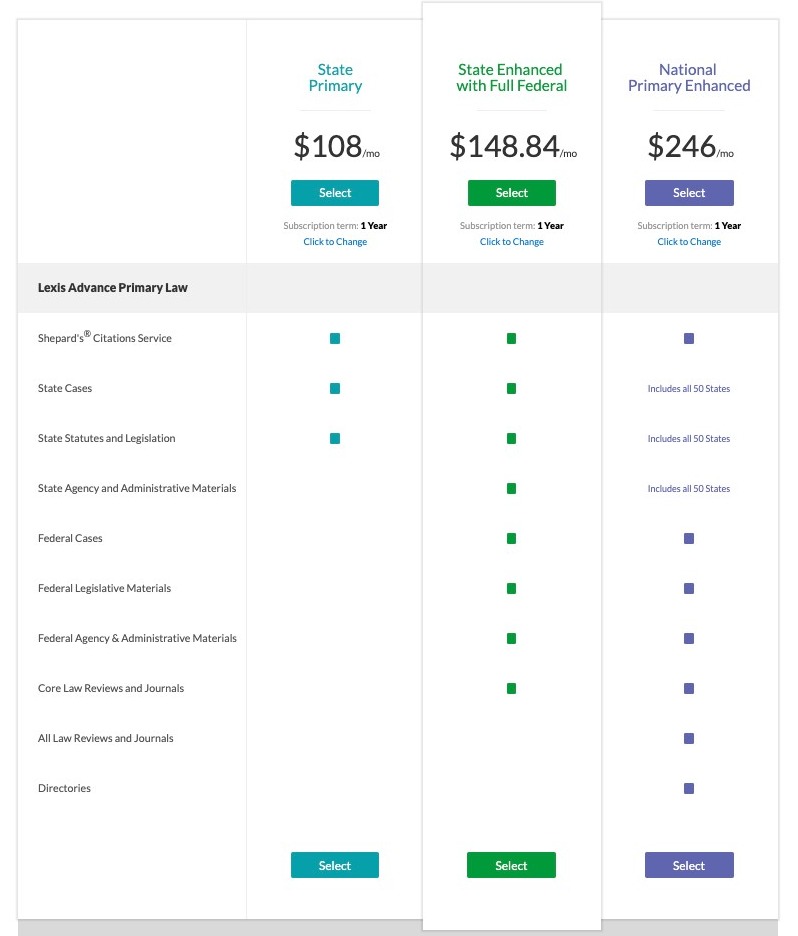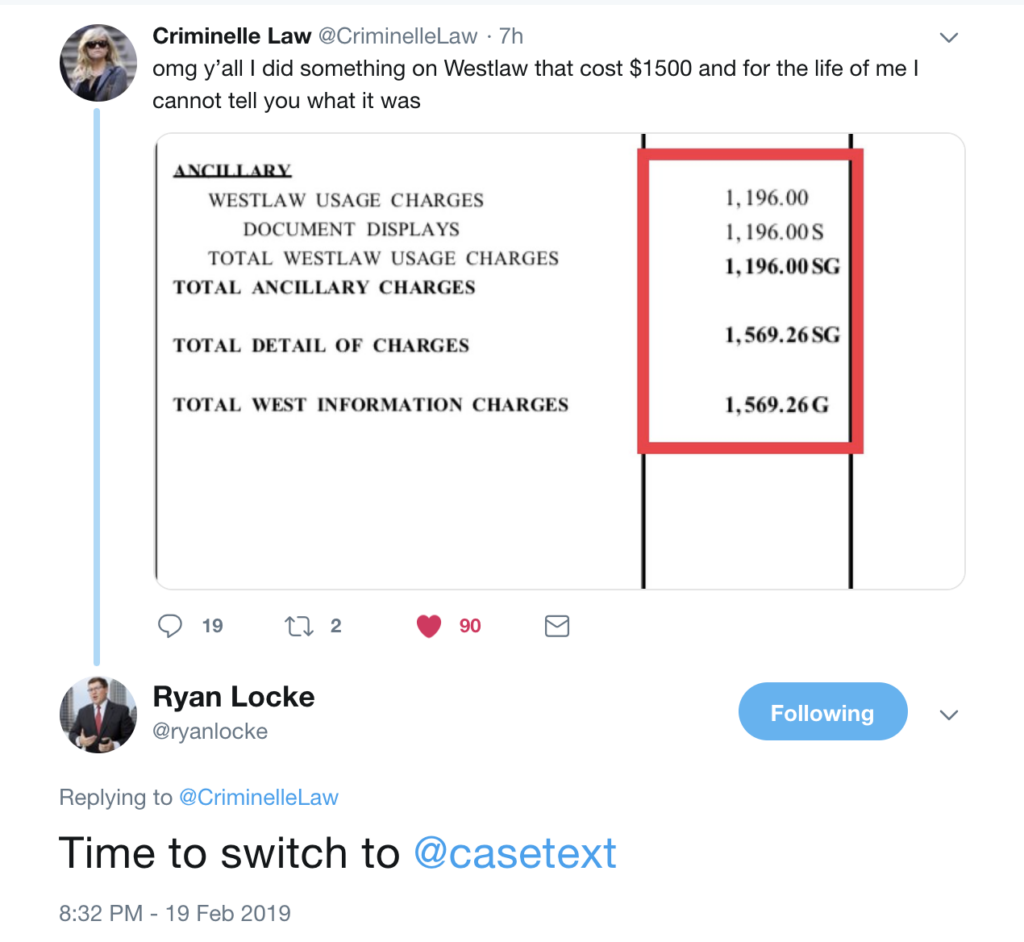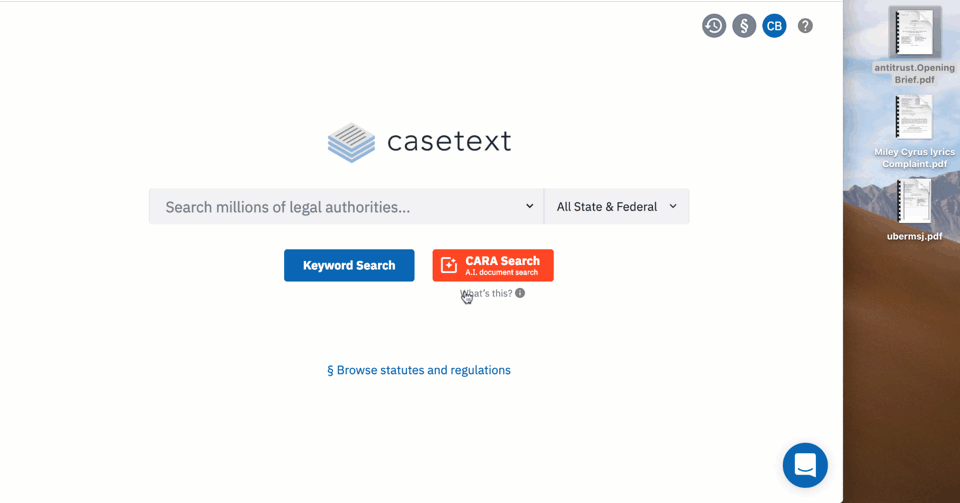[Update — since publication of this post, Lexis has raised their prices by $240 per year (!) This post now reflects Lexis’ new, higher pricing.]
LexisNexis has taken an extraordinary step important for most lawyers, and there hasn’t been much coverage of it.
LexisNexis has released transparent, self-serve pricing for their core legal research product for smaller firms. This is a big deal—it might represent a way that your firm can save thousands of dollars a year, and it’s a shift in the way LexisNexis has been doing business for a very long time.
This article details the new pricing, a few “gotchas” to watch out for, and how you can take advantage of the new plans whether you’re a LexisNexis subscriber or not.
But first, to address a question that might be on your mind: why would we at Casetext, a new competitor to LexisNexis, cover this news? We’re doing so for a few reasons. First, we want to help attorneys like you get access to affordable legal research—even if it’s from our competitors. Quality representation often requires quality legal research, and to the extent it’s now more affordable through LexisNexis, that’s great news for the profession and our clients. Second, now that LexisNexis is finally transparent with their pricing and offerings, a real apples-to-apples comparison on price, content, and feature-set between Casetext and LexisNexis is for the first time possible. For many attorneys, we believe we’re the better option.
To understand why this is an extraordinary move by LexisNexis, it’s worthwhile to briefly cover some history.
Traditionally, the legacy legal research providers negotiate each legal research contract in secret, requiring you to sign an NDA about the pricing and other terms of your contract. They do this to extract that maximum price from you possible. If you don’t know what the market rate is, they’ll keep on upping the price until you cry “uncle.” You might end up paying twice as much as a peer for exactly the same service and coverage, and you’ll be none the wiser.
According to publicly available data regarding LexisNexis and Westlaw contracts, the same service can range wildly—we’ve seen contracts from $1,200 to $14,000 per year per attorney for very similar plans.
Most attorneys absolutely hate this business practice. It’s unfair and done solely to take as much from you as possible. But LexisNexis and Westlaw are able to get away with it because, until very recently, there has been no real competition for legal research. Most attorneys swallow the bitter pill of unfair, opaque, and high pricing.
So what changed? Over the last few years, new entrants providing innovative new solutions have shifted the market dynamics. Casetext is one of them. We are open and transparent with pricing—and you can buy with a credit card, online, without needing to deal with a salesperson (unless you want a training or walkthrough, which we’re happy to provide). Our pricing is $65 a month if you subscribe to an annual plan, or $89 a month if you subscribe month-to-month. There is only one price for the platform, and it gets you everything—all federal, all states, briefs, articles, and more; and advanced artificial intelligence technology, CARA A.I. search, which no other platform has.
The pressure put on LexisNexis and Westlaw by competitors like us is immense. Over the last 9 months alone, over 3,000 law firms have switched from LexisNexis and Westlaw to Casetext for legal research—and we are just one competitor. Fastcase and Casemaker, free with membership with many state and local bars, are getting increasingly better, and must be chipping away at the traditional legal research platforms.
The large providers needed to do something before they lost all their customers. Old and bad business practices couldn’t withstand the pressure that companies with transparent, affordable, all-inclusive, and self-serve pricing was placing on them.
Recently, attorneys started seeing online ads promoting new pricing from LexisNexis. Curious, attorneys clicked through and found the new pricing.

The pricing plan is available online here. It isn’t easy to find on their website—indeed, as far as we’re aware, it’s only accessible through online ads, not from the LexisNexis website. Which is a shame, because this pricing is better than what attorneys were used to seeing from LexisNexis.

For example, for a single attorney getting access to just their state’s laws, it can be as little as $75 a month. We have heard of similar plans that were nearly twice as much for the same coverage—a savings of $600+ per year, per attorney, compared to standard LexisNexis plans.
The offer is truly great and worth evaluating. But before you leap at it, there are a few things to keep in mind.

If you’re OK with the three-year lock-in, aware of the $25 a month extra fee, and ready to limit your research strictly to your plan—you should take advantage of the offer.

If you aren’t in a LexisNexis or Westlaw plan now, it’s easy: just go here, select your plan, enter your information, and you’re done.
If you’re currently in a plan with a legal research provider, there’s still hope. You should call your sales representative, let them know you are aware of the new pricing, and press them to match. Sales representatives often have wide latitude on pricing (more than they’re willing to let on at first), and the last thing they want to do is lose a client. Use the same negotiating skills you use in your everyday lawyering work. It’s unpleasant, but it can save you thousands.
Here are the phone numbers for the sales lines for LexisNexis and Westlaw:
Another option is to switch to one of the new legal research providers like Casetext. You may find, as have thousands of law firms, that the newer products have a lot more to offer for a lot less money.
Indeed, part of why LexisNexis’ new pricing is such a big deal is that it finally lets you compare legal research tools on pricing, contract terms, coverage, and features transparently and easy.
Here’s a breakdown of how Casetext stacks up to the new plan:

But don’t take our word for it—give it a spin yourself here with a two-week free trial. If you like what you see, we have a plan that enables you to essentially get Casetext free for the time remaining on your LexisNexis or Westlaw contract.
LexisNexis’ new pricing is a major move for the legal research industry, and an intelligent response to pressure from newer legal research providers. We encourage you to take advantage of it if you want to work with LexisNexis—or even if you want to use it to reduce the pricing of your pre-existing contract.
But this might also be the time to evaluate alternatives. Even with LexisNexis’ new low pricing, there are still hidden fees, limited content, long terms, and you’ll be missing out on new technologies that make research easier, faster, and more on-point.
Rapidly draft common legal letters and emails.
How this skill works
Specify the recipient, topic, and tone of the correspondence you want.
CoCounsel will produce a draft.
Chat back and forth with CoCounsel to edit the draft.
Get answers to your research questions, with explanations and supporting sources.
How this skill works
Enter a question or issue, along with relevant facts such as jurisdiction, area of law, etc.
CoCounsel will retrieve relevant legal resources and provide an answer with explanation and supporting sources.
Behind the scenes, Conduct Research generates multiple queries using keyword search, terms and connectors, boolean, and Parallel Search to identify the on-point case law, statutes, and regulations, reads and analyzes the search results, and outputs a summary of its findings (i.e. an answer to the question), along with the supporting sources and applicable excerpts.
Get answers to your research questions, with explanations and supporting sources.
How this skill works
Enter a question or issue, along with relevant facts such as jurisdiction, area of law, etc.
CoCounsel will retrieve relevant legal resources and provide an answer with explanation and supporting sources.
Behind the scenes, Conduct Research generates multiple queries using keyword search, terms and connectors, boolean, and Parallel Search to identify the on-point case law, statutes, and regulations, reads and analyzes the search results, and outputs a summary of its findings (i.e. an answer to the question), along with the supporting sources and applicable excerpts.
Get a thorough deposition outline in no time, just by describing the deponent and what’s at issue.
How this skill works
Describe the deponent and what’s at issue in the case, and CoCounsel identifies multiple highly relevant topics to address in the deposition and drafts questions for each topic.
Refine topics by including specific areas of interest and get a thorough deposition outline.
Ask questions of contracts that are analyzed in a line-by-line review
How this skill works
Allows the user to upload a set of contracts and a set of questions
This skill will provide an answer to those questions for each contract, or, if the question is not relevant to the contract, provide that information as well
Upload up to 10 contracts at once
Ask up to 10 questions of each contract
Relevant results will hyperlink to identified passages in the corresponding contract
Get a list of all parts of a set of contracts that don’t comply with a set of policies.
How this skill works
Upload a set of contracts and then describe a policy or set of policies that the contracts should comply with, e.g. "contracts must contain a right to injunctive relief, not merely the right to seek injunctive relief."
CoCounsel will review your contracts and identify any contractual clauses relevant to the policy or policies you specified.
If there is any conflict between a contractual clause and a policy you described, CoCounsel will recommend a revised clause that complies with the relevant policy. It will also identify the risks presented by a clause that does not conform to the policy you described.
Get an overview of any document in straightforward, everyday language.
How this skill works
Upload a document–e.g. a legal memorandum, judicial opinion, or contract.
CoCounsel will summarize the document using everyday terminology.
Find all instances of relevant information in a database of documents.
How this skill works
Select a database and describe what you're looking for in detail, such as templates and precedents to use as a starting point for drafting documents, or specific clauses and provisions you'd like to include in new documents you're working on.
CoCounsel identifies and delivers every instance of what you're searching for, citing sources in the database for each instance.
Behind the scenes, CoCounsel generates multiple queries using keyword search, terms and connectors, boolean, and Parallel Search to identifiy the on-point passages from every document in the database, reads and analyzes the search results, and outputs a summary of its findings (i.e. an answer to the question), citing applicable excerpts in specific documents.
Get a list of all parts of a set of contracts that don’t comply with a set of policies.
Ask questions of contracts that are analyzed in a line-by-line review
Get a thorough deposition outline by describing the deponent and what’s at issue.
Get answers to your research questions, with explanations and supporting sources.